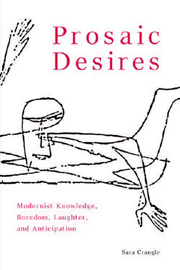4 - In the Meantime
Published online by Cambridge University Press: 12 September 2012
Summary
Laughter begins with a recognition or anticipation of something humorous, and this moment of perception is highly unpredictable. As Martin Armstrong observes in Laughing (1928):
Thinking, and to some extent, even dreaming can be performed when desired. We can say: Let us eat, Let us drink, Let us smoke, Let us idle, and so saying we can proceed to do these things, but we cannot deliberately set ourselves to laugh … Certain statements, a certain event or set of events may, circumstances being favourable, produce the laugh, and we may make the statements or do our best to procure the events and await results: but we can do no more than wait. (14)
Armstrong's discussion suggests that a longing for an ungraspable otherness lies at the heart of laughter, and the desirability of sharing this experience, which is as pleasurable and commonplace as eating and drinking. So consumed is he with his subject he almost describes a world attending on the next guffaw, keenly anticipating its next risible release. But ultimately, Armstrong believes laughter is an intimate experience that regrettably, cannot be transposed to the global sphere: he contends that if the nations involved in the First World War had been able to laugh at themselves, conflict might have been prevented – instead, the absurdity of war had to be waited out. Armstrong's constant mention of anticipation when discussing laughter brings a salient point to light: waiting is a quotidian longing that depends upon otherness and can be experienced personally and globally.
- Type
- Chapter
- Information
- Prosaic DesiresModernist Knowledge Boredom Laughter and Anticipation, pp. 139 - 173Publisher: Edinburgh University PressPrint publication year: 2010



